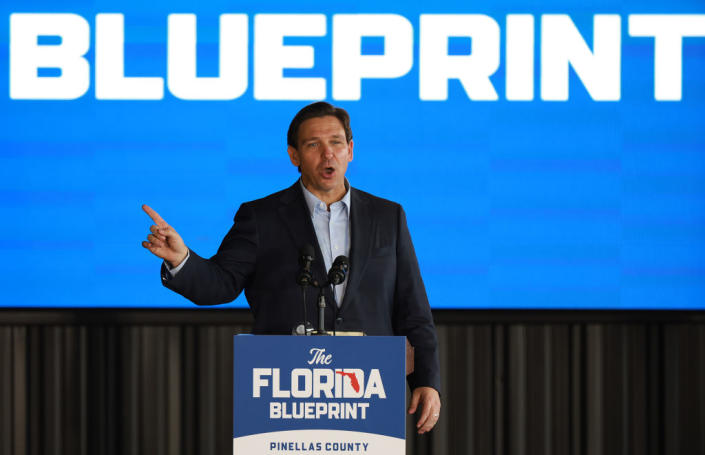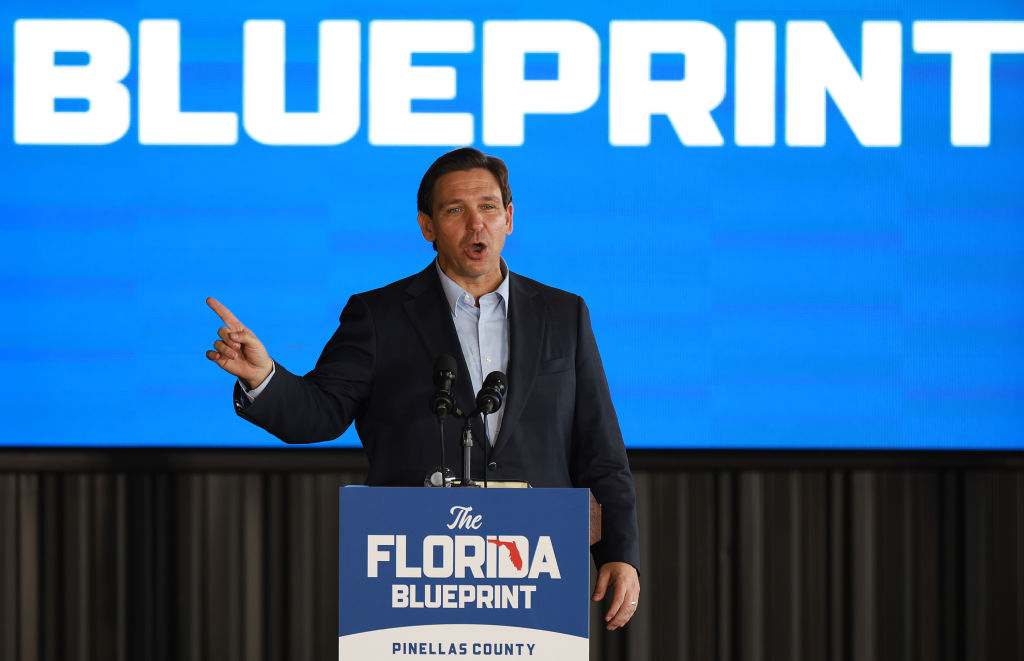
Florida Governor Ron DeSantis speaks at an event showcasing his recently released book “The Courage To Be Free: Florida’s Blueprint For America’s Revival” at the Orange County Choppers Road House & Museum on March 8, 2023 in Pinellas Park, Fl. Credits – Joe Raedle—Getty Images
Media coverage of Florida Governor Ron DeSantis’s near-announced candidacy for president is already in full swing, and so far the script is exactly as his handlers would like it to be. The governor regularly opens new fronts in the culture wars and raises the alarm about critical race theories, transgender rights or border policies. In response, liberal pundits fall into the trap of highlighting the very issues DeSantis has chosen to inflame his base.
Omitted from the public debate over DeSantis’s policies is almost any discussion of his actual state of governance – what exactly he has delivered to his state’s citizens, especially those without seven-figure incomes and lavish investment portfolios.
Even a cursory dip into the statistics of social and economic well-being reveals that Florida falls short in almost every measure that matters to the lives of its citizens. More than four years into DeSantis’ governorship, Florida continues to languish toward the bottom of state rankings that assess the quality of health care, school funding, long-term elder care and other areas essential to a successful society.
Florida may be the place where “wake up to die” — as DeSantis likes to say — but it’s also where teacher salaries are among the lowest in the country, unemployment benefits are stingier than any other state, and wage theft flourishes with little interference from the DeSantis administration. In 2021, DeSantis campaigned against a successful ballot initiative to raise the state’s minimum wage, which was stuck at $8.65 an hour. Under DeSantis’s watch, the Sunshine State hasn’t exactly been a working-class paradise.
Read more: Why “Woke” is a handy Republican dog whistle
DeSantis weapons the culture wars to divert attention from the core missions of his governorship, which is to starve programs aimed at improving the lives of ordinary citizens so he can maintain low taxes for the wealthy and corporations. Florida is the ideal getaway for privileged Americans who don’t want to pay their fair share of taxes. It has no personal income tax and its corporate tax rate of 5.5% is one of the lowest in the country. An investigation by the Orlando Sentinel in late 2019 revealed the surprising fact that 99% of Florida businesses were not paying corporate taxes, fueled by tax evasion and state officials giving low priority to enforcing tax laws.
This is a pattern that emerges in the statistics of many Republican-led states, which on average spend fewer dollars per capita on health care, public education and other critical services compared to their blue counterparts, while ensuring that corporations and wealthy individuals are given priority for tax relief. Arizona lowered taxes every year between 1990 and 2019, followed by a shift to a flat tax this year that will cost the budget $1.9 billion. Meanwhile, public school spending ranks 48th out of 50 states.
In Florida, the state’s tax revenue comes largely from sales and excise taxes, which hit the poor and middle class hardest. A 2018 study by the left-leaning Institute on Taxation and Economic Policy found that Florida had the third least equitable tax system of the 50 states. In the state’s “reverse” tax structure, the poorest 20% of Florida families paid 12.7% of their income in taxes, while those with incomes in the top 4% paid 4.5% and the top 1% 2.3%. , the study said.
Florida taxpayers get less for their money than residents of many other states. The Commonwealth Fund, a private foundation that studies health care systems worldwide, found in its 2022 “scorecard” that Florida had the 16th worst health care out of the 50 states. It’s no wonder Florida ranks among the northern blue states in life expectancy and death rates from cancer, diabetes, fatal overdoses, teen birth rates, and infant mortality.
Largely because of DeSantis’ stubbornness, Florida is one of 10 states that have refused to expand Medicaid under the Affordable Care Act, an act of political resentment that has cost those states billions in federal healthcare dollars and killed thousands. More than 12% of Floridians have no medical insurance, a record worse than all but four other states. Despite having the highest retirement rate in the country, Florida has the worst long-term care rate of the 50 states, according to the American Association of Retired Persons.
Public schools are no better than the health care system in DeSantis’ Florida. Not only did Florida rank 49th in the nation for average teacher salary in 2020, but the Education Law Center, a nonprofit advocacy group based in New Jersey, found in a 2021 report that the state had the seventh lowest funding per student in the country. Education Week, which annually ranks the state’s public school and looks beyond test scores, ranked Florida 23rd in its 2021 report, a mediocre performance for a large and prosperous state.
It says something about the state of our political discourse that Florida’s denuded public sector stopped being an issue in last year’s gubernatorial campaign. By supporting DeSantis’ Democratic opponent, Charlie Crist, the Tampa Bay Times spent so many column inches on the incumbent’s demagoguery, vindictiveness and authoritarian tendencies that it failed to penetrate even the minutest details of his administration. “It doesn’t matter what you think about the state of Florida’s economy, the schools or the future…,” the paper wrote, “the choice really is that simple: Do you want the state to be ruled by a decent man? or a bully?”
To be fair to the media, DeSantis and his allies manned the culture wars trenches so ferociously that it was all reporters could do to keep up with all the bombing. How do you dig into the state’s tax policy when your governor is flying planeloads of migrants to Martha’s Vineyard or declaring war on Disney for making a statement against the state’s so-called “Don’t Say Gay Law”?
But that is precisely the point of wedge issues, as they have been wielded for decades by vile politicians, to anger and distract voters from noticing the actions of government officials that mainly benefit the wealthy and against the be of general interest.
As the 2024 election approaches, DeSantis may not be allowed to achieve nationally what he did in his state: disguise his servitude to the wealthy by scaring working people with stories of recruiting transgender people and “socialist” college professors. There are undeniable signs that Americans are focused on what an activist government can do for the public good, as evidenced by the vote of Floridians to raise the minimum wage.
DeSantis’ failure to better serve his state’s most vulnerable citizens is his weak underbelly in a national campaign.

